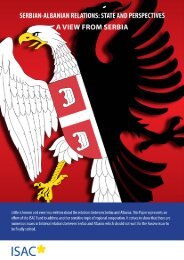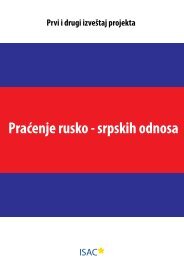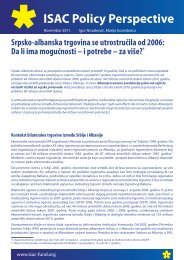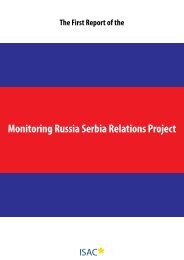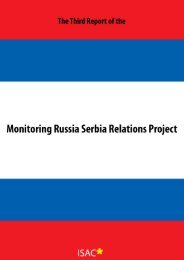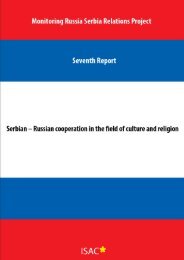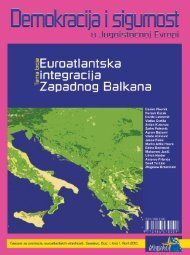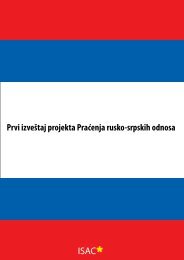the process of security sector reform - ISAC Fund
the process of security sector reform - ISAC Fund
the process of security sector reform - ISAC Fund
Create successful ePaper yourself
Turn your PDF publications into a flip-book with our unique Google optimized e-Paper software.
Robert S. Tomasovic PEACE KEEPING MISSIONS<br />
Robert S. Tomasovic PEACE KEEPING MISSIONS<br />
Kosovo – 4700 Civilian Police are <strong>the</strong>re to maintain law and order while developing<br />
a new police service for <strong>the</strong> area. This was <strong>the</strong> first UN mission where<br />
International police were tasked with full executive (law enforcement) authority.<br />
East Timor - The Civilian Police <strong>the</strong>re maintained law and order until <strong>the</strong> establishment<br />
<strong>of</strong> a credible and pr<strong>of</strong>essional national police service.<br />
Bosnia & Herzegovina – More than 1800 police <strong>of</strong>ficers from 45 different<br />
countries carried out tasks relating to human rights investigations, monitoring <strong>of</strong><br />
local police and restructuring local police services. That mission and its police<br />
responsibilities have devolved to a European Union Police Mission.<br />
In United Nations missions Civilian Police <strong>of</strong>ficers may be armed or unarmed<br />
depending on <strong>the</strong> mandate <strong>of</strong> <strong>the</strong>ir mission. In <strong>the</strong> majority <strong>of</strong> missions, Civilian<br />
Police <strong>of</strong>ficers are unarmed. There is also a decision as to giving Civilian Police<br />
enforcement or non-enforcement authority declared in <strong>the</strong> UN mandate. In only<br />
a few missions Civilian Police have been given full executive authority and<br />
perform as a police force in <strong>the</strong> mission. In those cases where <strong>the</strong>y have executive<br />
authority <strong>the</strong>y are also charged with <strong>the</strong> responsibility to establish a local police<br />
force. In most missions <strong>the</strong> role <strong>of</strong> Civilian Police does not involve <strong>the</strong> authority<br />
to take enforcement actions but ra<strong>the</strong>r <strong>the</strong>y monitor, advise, train and liaise with<br />
<strong>the</strong> local police. Variations involve non-enforcement types <strong>of</strong> missions with<br />
armed Civilian Police who carry weapons for self-protection only.<br />
The UN Civilian Police Division (Department <strong>of</strong> Peacekeeping Operations)<br />
goals are to:<br />
• Support <strong>the</strong> Civilian Police component <strong>of</strong> <strong>the</strong> UN peace operations<br />
• Enhance planning capacity <strong>of</strong> police component <strong>of</strong> UN operations<br />
• Assist in enhancing <strong>the</strong> performance, effectiveness and efficiency <strong>of</strong><br />
local criminal justice systems<br />
• Enhance <strong>the</strong> ability to deploy a functional police component rapidly<br />
• Improve <strong>the</strong> quality <strong>of</strong> Civilian Police representation in <strong>the</strong> field<br />
The European police best practice vs. traditional (classic) policing is <strong>the</strong> construct<br />
under which UN Civilian Police <strong>of</strong>ficers work. This model is characterized by:<br />
• Despecialization vs. specialization, training most modern police forces<br />
as generalist, thus providing an economy <strong>of</strong> effort. This decentralized<br />
vs. centralized approach allows an emphasis on Community Oriented<br />
Policing; allowing police forces today to establish small stations within<br />
communities, in so doing, <strong>the</strong> force is better able to work with residents.<br />
• Bottom up management vs. top down autocratic management since <strong>the</strong><br />
complexities <strong>of</strong> police work today requires that street <strong>of</strong>ficers participate<br />
as equal partners with management in <strong>the</strong> decision making <strong>process</strong>. This<br />
allows <strong>the</strong>m to add value to <strong>the</strong> <strong>process</strong> and <strong>the</strong> outcome.<br />
Community policing vs. government policing; increasing <strong>the</strong> efficacy <strong>of</strong> <strong>the</strong><br />
police is directly related to <strong>the</strong>ir ability to harness <strong>the</strong> community in establishing<br />
a safe and secure environment…meaning <strong>the</strong> police can no longer just perceive<br />
<strong>the</strong>mselves as an organ <strong>of</strong> <strong>the</strong> State and implementers <strong>of</strong> <strong>the</strong> government’s will.<br />
Service-oriented vs. enforcement-oriented police, meaning that today’s police<br />
forces don’t just enforce laws; <strong>the</strong>y must be responsive to public demands.<br />
There are two traditional measurements <strong>of</strong> how democratically a police force<br />
operates. First <strong>the</strong>y are responsive to <strong>the</strong> needs and desires <strong>of</strong> <strong>the</strong> public <strong>the</strong>y<br />
serve and such forces listen to and consider <strong>the</strong> concerns <strong>of</strong> <strong>the</strong> community.<br />
Second, <strong>the</strong>y are accountable within <strong>the</strong> rule <strong>of</strong> law and people who feel agrieved<br />
by police actions have a vehicle <strong>of</strong> redress established in a manner that ensures<br />
due <strong>process</strong><br />
Finally, in regards to Civilian Police, military PKO troops must be helped to<br />
understand that <strong>the</strong>y are not in charge, <strong>the</strong>y do not “own” <strong>the</strong>ir AO − <strong>the</strong>y share<br />
responsibility and authority with a variety <strong>of</strong> civilian institutions, agencies, and<br />
groups. If <strong>the</strong> military take over and insist on running things, civilians ei<strong>the</strong>r<br />
cannot or may see no need to assume <strong>the</strong> responsibilities <strong>the</strong>y will ultimately<br />
have to assume in order to form or rebuild a sustainable sovereign country.<br />
CIVILIAN ACTORS IN PEACEKEEPING OPERATIONS<br />
All participants must recognize that it is civilian authorities/politicians who<br />
authorize peacekeeping operations; whe<strong>the</strong>r this is UNSC, EU, African Union,<br />
196 197





